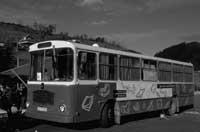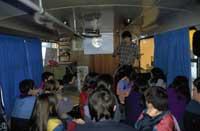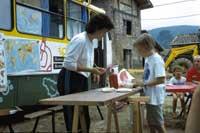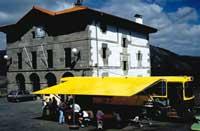Itinerant School of Environment

Among the groups, schools, companies and projects created in favor of the environment there is one that can be considered special: Itinerant School of Environment of Ibiur Kultur Taldea. This is a work done on the green bus of the Tolosa-Donostia line of 27 years and more than 2 million km. and today we wanted to interview the school leaders: They are the tolosarra Josu Iztueta and the leitzarra Miguel Mari Elosegi.
Hello, how about? Tell us where you came up with this idea.
For many years I have visited villages outside and have always intended to do something in Euskal Herria (Josu). A year and a half ago, we began to meet with Miguel Mari and three or four other friends and we came up with the idea of preparing a traveling school. If we got a great vehicle and prepared it, we saw the possibility of approaching the villages and offering exercises there.
How did they get the bus?
At first we intended to repair a truck, but that road deteriorated and we saw that there were five buses that were used very rarely in the “cars” of Lasarte. We went to talk to the elders and as they liked the idea, they gave us the bus and immediately we started to fix it.
How can the school be adapted within a bus?
We gave her a name and put her class, but of course it's not a normal school. In the middle and behind the bus we have chairs and tables of between 20 and 25 people. A small library, a slide projection screen and a space for cold weather. However, in good weather, we started inside the bus and went outside to work at the tables. A large shed protects us from the sun or rain.
What are the exercises you carry out?

All actions we take are related to the environment. We usually start with a slide session in which we are located in Euskal Herria and present its history and landscape as an introduction. We provide an overview of geology, relief, climate and human beings, but introducing local details as far as possible. Then, we do exercises with keys and manuals to start knowing plants and animals. We studied the marks and signs of the animals, made plaster molds and finished with some exercises of sharpening of senses. It is a way of working alive and enjoyable, allowing people to get started on these issues.
What are your goals?
The first is to know and respect what people have in their village; if we do not appreciate what surrounds us, we will hardly improve or support. The second is to offer new activities. The bus, at least until now, has reached all the villages that have called us and we consider it very interesting to visit small independent spaces, because all deserve an environmental effort. In the cities we have moved from neighborhood to neighborhood to decentralize actions. Third, prove that our buses or similar old junks may have value. And finally, the fourth, which is expressed in Basque. There are still not so many activities offered in Basque and, if possible, we work only in Basque.
Who is the traveling environmental school for?
The didactic module we have worked so far can be suitable for anyone over 10-12 years old, even for adults. However, in the villages visited, from the age of 4, we have been talking to people over 65 and we have adapted to everything. However, in most cases we have had with us young people between 10 and 15 years old, and in the actions we are preparing, there is a new module for the little ones and another for the adults.
What is a school day like?

Normally we start early in the morning and leave Toulouse before sunrise to reach the town where it is located. In 40 minutes after arriving, we have the shed, the tables and all the material that we will use. Then, we took the students and held two sessions of three hours: one until noon and another at the table. Sometimes we delete one of these two sessions and in the evening we offer a talk with slides. Then we got all together and headed home, or stayed on the bus if the next day we have to repeat the session or visit another nearby town.
What are the exercises that most please students?
In the slide session, fossils and exercises with fever. These special stones are of great taste to people, and despite being common, it is often not known that in the village can be found.
Making plaster molds in animal and plant exercises. Many times the session ends and some student comes back to repeat the exercises.
The last hour is also nice. Games to work the senses generate many movements and surprises and, in addition to having fun, receive the message that the senses can give a lot of information and that it is essential to keep the attention.
What people have you been in?
So far we have traveled schools and villages of Gipuzkoa and Navarra. We have usually done a single day, but in the big schools we have spent the whole week. Once we were in the Irurtzun Cultural Week and in addition to groups 20-30, one day we put ourselves in the town square for all audiences and with the help of others from the group, we work with anyone who approached. It was a nice experience.
What are the sources of funding?

Although we got the bus for free, preparation and internal material cost us a lot. We estimate that the cost of a working day is 50,000 pesetas and less if we spend a few days (because the bus does not have to move). As we have achieved some small grant, in most cases we have offered subsidized activities. That is why we have done every session between 30-35,000 pesetas. However, depending on the region, the protection has been different: Basque Government, Government of Navarra or Provincial Council of Gipuzkoa, for example.
Is the school going all year round?
Not all year or every day. In 1994 it was used for 6 months and this year a new route is expected, from the end of March to June and from September to November. Winter is not the best time to offer outside activities and in summer there are few classes underway and people's holidays are also given. In these months we will divide the villages by regions in order to move closely.
Who wants to contact you, where should you go? ? ?
We are Ibiur Kultur Taldea and we meet at 8 Letxukalea Street in Toulouse. We will contact you.





